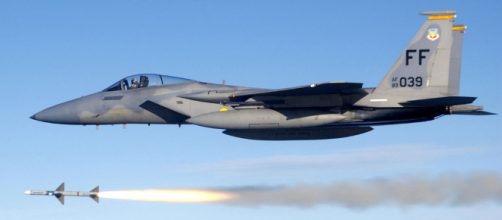USAF was reported earlier of having some problems with their logistic, airlift capacity, and combat readiness. The service reportedly has an insufficient number of combat-ready B-1 strategic bombers, aerial refueling tankers and airlift aircraft in its arsenal, causing much concern over potential future conflict with other major powers. However, the Air Force is fighting back, announcing new military contracts with top defense contractors Boeing, Raytheon, Northrop Grumman, and Rockwell Collins.
USAF announced a number of huge contracts this week, mostly for the improvement of the service’s aging fleets of tankers and fighter planes.
The latest contracts will not just improve the service’s weaponry and planes, but also the aircrew training and technologies. Joining the Air Force’s defense overhaul will include some of America's biggest defense contractors, Boeing, Raytheon, Northrop Grumman, and Rockwell Collins.
Boeing improves the KC-46 and F-15 fleets
Leading the defense charge is Boeing, Defense World reports. The Chicago-based aerospace and defense contractor has just won a $55 million modification contract for the telescopic boom of the KC-46 Pegasus, the military aerial refueling aircraft developed by Boeing. The KC-46 has been selected by the service to replace the aging fleet of Boeing-made KC-135 Stratotankers. The future tanker has already completed receiver certification testing with Lockheed Martin-developed F-35 aircraft.
Production of KC-64 will start at Boeing’s plant at Seattle, Washington. The deal is expected to be completed by 2021.
In addition to the KC-46 aircraft, the tech giant has also won a $10.4 million contract for the production and integration of the Advanced Display Core Processor (ADCP) II and other related technologies to the Air Force’s F-15 fighter planes.
Boeing also received around $9.2 million contracts to conduct some study in order to mitigate risks posed to the F-15 planes and its crews. The goal of that study is to reduce the flight risk from serious to medium. The work is expected to be completed by July 31, 2021, according to a recent statement by the US Defense Department.
Raytheon takes the futuristic laser weapon deal
The Air Force also wants to deploy a new weapon in its arsenal, a ground-based laser weapon system. The service has just awarded a $23.8 million contract to Raytheon to develop the two prototypes of High Energy Laser Weapon Systems (HELWS) to the service. The prototype weapons will be tested in an undisclosed location, outside the continental United States. the planned 10-kilowatt laser weapon system can be mounted or attached on small ground-based vehicles and can be controlled by an interface similar to that of the gaming or video game controller.
The prototype laser weapons, which will be used primarily against small drones and other advanced unmanned aerial system threats, will feature a range of components from the commercial technology industry.
These include high-performance lithium-ion batteries, the same power supply used in today’s electric vehicles. The work on the laser weapon system is expected to be completed by November 2020.
Rockwell enhances aircrews training and simulation
In addition to the top defense contractors Boeing and Raytheon, the USAF has also awarded a $40.2 million contract to Rockwell Collins Simulation & Training Solutions to support training devices to the service’s E-8 aircraft and crews. The Northrop Grumman-developer E-8 aircraft is the center of the Joint Surveillance Target Attack Radar System (commonly known as Joint STARS), the Air Force’s premier airborne command and control aircraft. The Joint STARS is a surveillance and battle management platform that tracks ground vehicles and aircraft, gather imagery and send tactical data to war commanders.
The work on Joint STARS is expected to be completed by August 2029.
Northrop Grumman beefs up the Air Force’s EW capabilities
The USAF has also awarded a $44 million contract to Northrop Grumman to beef up the service's Electronic Attack Pod Upgrade Program or EAPUP. As mentioned earlier here at Blasting News, the latest $44 million contract will be the third production order for the Air Force’s EAPUP. The deal is expected to increase the number of electronic pods and the Air Force’s EW (electronic warfare) capabilities. The deal represents the latest step on the Air Force’s ongoing effort to enhance its EW capabilities and build a more effective electronic countermeasure capable of defeating advanced threats posed by rogue nations and major adversaries.


